Governance

SPP-ARC is a multi-faculty Initiative overseen by the Dean of Faculty of Medicine and Dentistry. Administrative and research groups that comprise the program are listed below.
The oversight committee is comprised of multiple university parties, external experts, and community representatives that review the progress of SPP-ARC initiatives.
Chair(s)
Brenda Hemmelgarn (Chair), Richard Lehner (Vice Chair)
Members
- Lawrence Richer (Associate Dean, Research, College of Health Sciences)
- Aminah Robinson-Fayek (Vice President, Research & Innovation)
- Matina Kalcounis-Rueppell (College Dean and Vice Provost, College of Natural and Applied Sciences)
- Ben Willing (Faculty of Agriculture, Life, and Environmental Sciences)
- Sandy Davidge (WCHRI)
- Kim Falconer (Office of Advancement)
- Gregory Funk (Chair, Physiology)
- Peter Light (Chair, Pharmacology)
- Frank Wuest (Chair, Oncology)
- Mark Joffe (Alberta Chief Medical Officer)
- Sean Price (University Hospital Foundation)
The Steering Committee is comprised of SPP-ARC investigators representing different aspects of the research and training programs.
Chair
Matthias Götte
Members
- Gayle Piat
- Gregory Korbutt
- Lilly Pang
- Sue Tsai
- Kevin Kane
- Tom Hobman
- Vanessa Meier-Stephenson
- M. Joanne Lemieux
- Howard Young
- Stephanie Yanow
- Hubert Eng (GoA representative)
- Neil Sulakhe (GoA representative)
Members
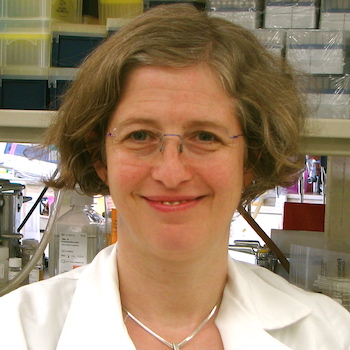 Viviana Simon, PhD is a Professor of Microbiology, Medicine and Pathology at the Icahn School of Medicine at Mount Sinai (ISMMS) in New York City, USA. She co-directs the Mount Sinai Center for Vaccine Research and Pandemic Preparedness. Professor Simon is an international leader in virology and infectious diseases who has the scientific and translational skills needed to tackle big problems in medicine. She is an Elected Fellow of the American Academy of Microbiology and serves as an Editor for the Journal of Virology.
Viviana Simon, PhD is a Professor of Microbiology, Medicine and Pathology at the Icahn School of Medicine at Mount Sinai (ISMMS) in New York City, USA. She co-directs the Mount Sinai Center for Vaccine Research and Pandemic Preparedness. Professor Simon is an international leader in virology and infectious diseases who has the scientific and translational skills needed to tackle big problems in medicine. She is an Elected Fellow of the American Academy of Microbiology and serves as an Editor for the Journal of Virology.
Professor Simon’s research provides novel solutions to infectious diseases with high public health concern by bridging basic research and translational medicine. Her work has shaped our understanding of HIV persistence, virus-host interactions and immune responses to viral infections. Her group has been at the forefront of SARS-CoV-2 research since the very beginning of the pandemic when NYC emerged as an early epicenter. Her multidisciplinary team has provided and continues to provide much needed knowledge on SARS-CoV-2 immunity in the context of evolving viral diversity.
 Tania Watts, PhD is a Professor of Immunology at the University of Toronto and holds the Canada Research Chair in anti-viral immunity. Her research studies the mechanisms of immune memory that can prevent reinfection, which ultimately can inform future work on vaccines and the identification of biomarkers to evaluate vaccine efficacy. Dr. Watts has a long-standing interest in T cell immunity in humans, particularly on influenza and more recently, SARS-CoV-2. She has contributed her expertise in Immunology to study the persistence of immunity to SARS-CoV-2, as well as to understand the immunogenicity of SARS-CoV-2 vaccines in immunocompromised people.
Tania Watts, PhD is a Professor of Immunology at the University of Toronto and holds the Canada Research Chair in anti-viral immunity. Her research studies the mechanisms of immune memory that can prevent reinfection, which ultimately can inform future work on vaccines and the identification of biomarkers to evaluate vaccine efficacy. Dr. Watts has a long-standing interest in T cell immunity in humans, particularly on influenza and more recently, SARS-CoV-2. She has contributed her expertise in Immunology to study the persistence of immunity to SARS-CoV-2, as well as to understand the immunogenicity of SARS-CoV-2 vaccines in immunocompromised people.
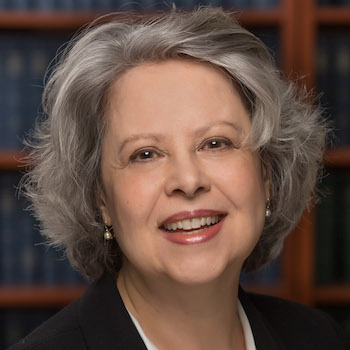 Youla Tsantrizos, PhD is a Professor in Chemistry and Associate member of Biochemistry at McGill University with expertise in drug discovery, including lead optimization, pre-clinical, and clinical development. Her research focuses on the design and synthesis of molecular tools to probe the function of therapeutically relevant biological targets, followed by optimization of leads to pre-clinical candidates.
Youla Tsantrizos, PhD is a Professor in Chemistry and Associate member of Biochemistry at McGill University with expertise in drug discovery, including lead optimization, pre-clinical, and clinical development. Her research focuses on the design and synthesis of molecular tools to probe the function of therapeutically relevant biological targets, followed by optimization of leads to pre-clinical candidates.
She held leadership roles as Group Leader and Distinguished Scientist at Boehringer Ingelheim, where she participated in the discovery of four clinically validated antiviral agents for the treatment of HCV and HIV. She served on Canada’s COVID-19 Therapeutics Task Force, providing advice on treatment under development and drugs to procure. As advisor for the COVID-19 Bio-manufacturing sub-committee, as member of the Canada-United Kingdom and Canada-France Expert Round Table on Pandemic Preparedness.
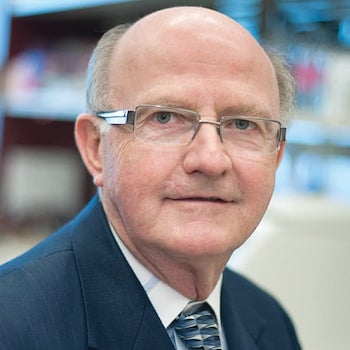 Lorne Babiuk, PhD, OC, SOM, FRSC, DSc, CAHS, NAI is a globally recognized leader in vaccine research. An expert in infectious diseases, immunology, virology, and vaccinology, Dr. Babiuk’s work led to the development of a vaccine against rotavirus infection in children, which is now a thing of the past thanks to vaccination.
Lorne Babiuk, PhD, OC, SOM, FRSC, DSc, CAHS, NAI is a globally recognized leader in vaccine research. An expert in infectious diseases, immunology, virology, and vaccinology, Dr. Babiuk’s work led to the development of a vaccine against rotavirus infection in children, which is now a thing of the past thanks to vaccination.
He served as the Vice President of Research at the University of Alberta and founded VIDO (Vaccine and Infectious Disease Organization), a prominent institute at the University of Saskatchewan for COVID-19 and emerging infectious diseases research in humans and animals. He helps set science policies in Canada and internationally by serving on numerous committees and has received numerous prestigious honours and awards, including the Order of Canada, Saskatchewan Order of Merit, and Fellow of the Royal Society of Canada, among others.
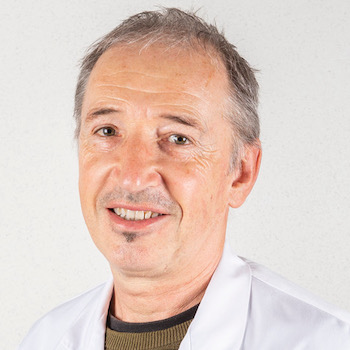 Bruno Canard, PhD is a French CRNS (Centre National de la Recherche Scientifique) Research Director at the Architecture and Functions of Biological Macromolecules Laboratory at Aix-Marseille Université in France. He made important contributions to the field of structure-function of replicative viral enzymes, from the heavily competitive HIV reverse transcriptase-mediated drug resistance field to enzymes from the most neglected RNA viruses.
Bruno Canard, PhD is a French CRNS (Centre National de la Recherche Scientifique) Research Director at the Architecture and Functions of Biological Macromolecules Laboratory at Aix-Marseille Université in France. He made important contributions to the field of structure-function of replicative viral enzymes, from the heavily competitive HIV reverse transcriptase-mediated drug resistance field to enzymes from the most neglected RNA viruses.
Following his discovery of the Dengue virus methyltransferase (MTase) involvement in RNA capping, he joined the Nidovirus scientific community just before emergence of the worldwide SARS crisis and has since built a team with international visibility on viral enzymes: structure, function, and drug-design. The current pandemics has cast light on his achievements in Nidovirus, highlighting achievements in crystal structures with thorough functional and mechanistic analysis. His multi-disciplinary collaborations led to the Antiviral Drug-Design Platform in Marseille in 2002, which performs medium to large-scale target-based screens of viral replication inhibitors. He coordinated VIZIER, a European large-scale viral structural genomics/pandemic preparedness project, and leads several European projects on COVID-19 responses (SILVER, IMI-CARE, SCORE). Among his numerous awards, he was appointed Chevalier de l’Ordre National du Mérite by the President of France in 2023.
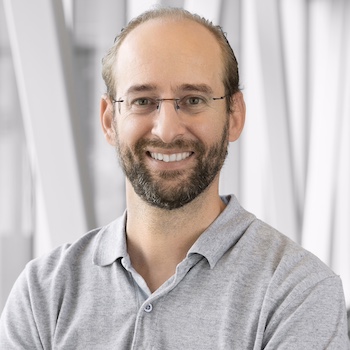 Andrés Finzi, PhD is a Professor at the Department of Microbiologie, Infectiologie et Immunologie, Université de Montréal. An expert in entry inhibitors and envelope glycoproteins, he identified key structural elements within HIV-1 envelope glycoproteins essential for viral entry. Dr. Finzi made seminal contributions to the field of HIV/AIDS and SARS-CoV-2 research. His work has important implications for the development of new therapeutic strategies for HIV-1 and SARS-CoV-2, including studies that can help inform policies surrounding vaccinations. His work has been recognized through several prestigious awards and since 2020 he is a member of College of New Scholars, Artists and Scientists of the Royal Society of Canada.
Andrés Finzi, PhD is a Professor at the Department of Microbiologie, Infectiologie et Immunologie, Université de Montréal. An expert in entry inhibitors and envelope glycoproteins, he identified key structural elements within HIV-1 envelope glycoproteins essential for viral entry. Dr. Finzi made seminal contributions to the field of HIV/AIDS and SARS-CoV-2 research. His work has important implications for the development of new therapeutic strategies for HIV-1 and SARS-CoV-2, including studies that can help inform policies surrounding vaccinations. His work has been recognized through several prestigious awards and since 2020 he is a member of College of New Scholars, Artists and Scientists of the Royal Society of Canada.
The Infrastructure Committees are Subcommittees of the Steering Committee, comprised of SPP-ARC investigators, as well as faculty and staff with varying expertises related to each infrastructure project.
Chairs
- Tom Hobman (BSL3)
- Gregory Korbutt, Gayle Piat (ACTM)
- M. Joanne Lemieux, Howard Young (Structural Biology)
The administrative staff the supports the operations of SPP-ARC ensure the coordination of research, staff, training and financial components of the program.
Staff
- Director of Training - Ksenia Rybkina
- Research Coordinator - Michelle Zadunayski
- Bioinformatics Systems Analyst - Robert Smiley